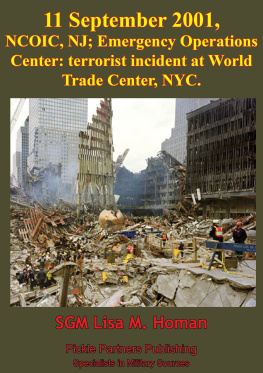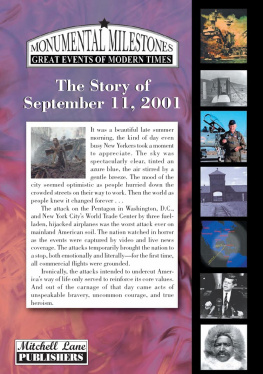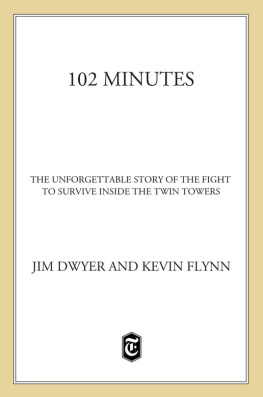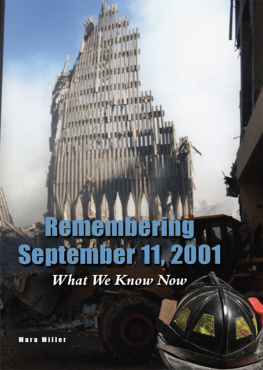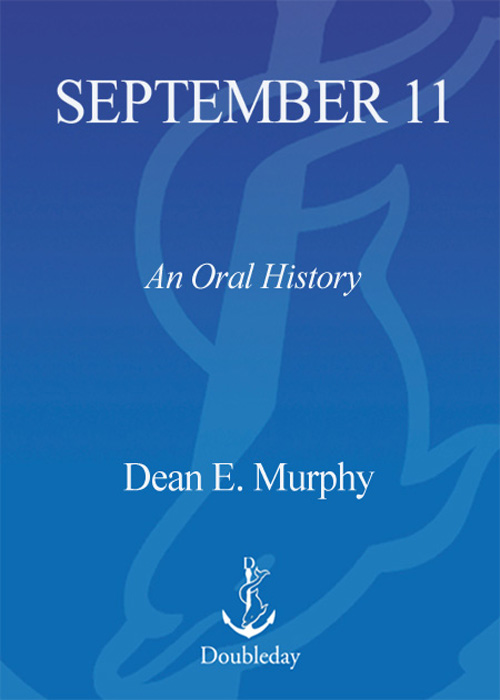
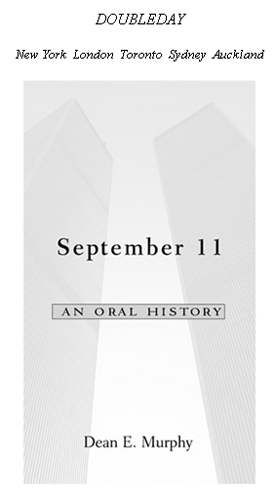
CONTENTS
In honor of those who lived
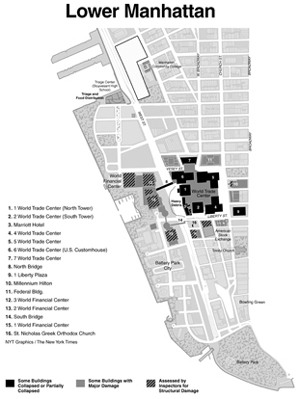
The Pentagon
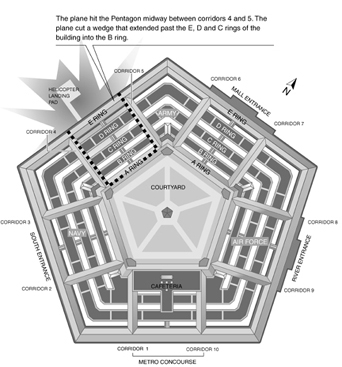
PREFACE
September 11 was primary day in New York City and I was covering one of the mayoral candidates on the Republican ballot, Michael Bloomberg, for The New York Times. The billionaire political newcomer was expected to trounce his primary opponent, though the political pundits considered him a long shot in the general election in November. But then nobody knew that New York on September 11 would not be the same New York it was on September 10. At years end, Bloomberg would take the oath as New York Citys 108th mayor.
The night of September 10 had been a very late one. Bloomberg attended Republican rallies across the city, ending up in Staten Island. He was not a very dynamic speaker, but the crowds of Republican faithful chanting, We want Mike! pumped him up. Wherever he went, he responded with a wordplay based on the primary date. If you write it out, it is 9-1-1, he told the crowds. It is a call for help for this city. I jotted the quote down on page 9 of my notebook and again on page 17.
Of course September 11 would be a call for help, but not in the way Bloomberg was imagining. Months later it was a bit unnerving to flip through that notebook and see those words trivialized as part of a political campaign. I dont blame Bloomberg. On the night he spoke them, they were just a throwaway soundbite, the invention of some enterprising speechwriter. Now they screamed out as another telling moment in the story of unsuspecting New Yorkevidence of how nave and complacent we were, how little we knew about the agony of real cries for help that would come the next morning.
The primary returns on September 11 were expected to arrive late, maybe even after midnight, so I had planned that morning to drive into Manhattan from my home in New Jersey instead of taking the bus. It had already been decided that I should skip the early morning ritual of Bloomberg posing for the cameras as he cast his ballot at P.S. 6 on East 81st Street. So I was taking my time. It was my youngest sons birthday. He was turning two. We sang Happy Birthday and had an ice cream cake for breakfast. I knew the Lincoln Tunnel would be a parking lot during rush hour, so after breakfast I drove my two older boys to school. We said our good-byes and I switched on the radio to get the traffic report:
WCBS news time 8:48. It is traffic and weather together, sponsored by Henry Millers Theater. Tom Kaminski, Chopper 880: All right, Pat, we are just currently getting a look at the World Trade Center. We have something that has happened here, at the World Trade Center. We noticed flame and an awful lot of smoke from one of the towers of the World Trade Center. We are just coming up on this scene. This is easily three quarters of the way up. Whatever has occurred, has just occurred, within minutes. And we are trying to determine exactly what that is. But currently we have a lot of smoke at the top of the towers at the World Trade Center. We will keep you posted.
As the helicopter got closer, the details got more specific: I am just coming up now and looking at the north face of the World Trade Center. It appears at least from this vantage point that something has hit it. Something has gone into the World Trade Center. I do not have that confirmed in any way, shape or form, but there is a gash across, I would want to say about ten stories down from the top of the World Trade Center, from right to left.
When I got home a few minutes later, my cell phone rang. It was the Metro desk. The newsroom is virtually empty at that time of the morning, but they thought maybe I was already at work following Bloomberg. They wanted me to break away and come into the office to help figure out which companies were located on the floors where the jet had hit. But I was still in New Jerseyon a good day, 30 minutes away. And this was not a good day. I went into the house and turned on the television. In a few minutes, the second plane struck the South Tower. I knew I needed to get into Manhattan, so I ran back outside to the car. I hadnt even pulled out of the driveway when my wife shouted out the front door that the Lincoln and Holland tunnels had been closed. Manhattan was being sealed off.
I tried calling the office but it was impossible to get through on the telephone. I was able to dial an Internet access number so I sent an e-mail. I cant get across the Hudson. Cant get through on the phones. But can sign on with the toll-free number. Please onpass any instructions.
I got a response from one of the editors.
The election is canceled. Do scene in your neighborhood for an hour, then get back to me. We want you to try to come in, but it may take forever.
It did. I finally walked into the newsroom at six oclock. After going to a hilltop in Montclair and watching the thick white cloud consume Lower Manhattan, I set out for the Hudson River. It took me three hours to go 15 miles. And even then I was turned away by the police at Liberty State Park, where hundreds of the walking wounded had been evacuated, so I continued on to Jersey City, where I boarded a PATH subway train to 33rd Street.
I was immediately put to work on the phones, first trying to get information on the Rev. Mychal Judge, a Franciscan friar who was a Fire Department chaplain. He had died, apparently of a heart attack, during one of the building collapses. I eventually got in touch with Brother Thomas Cole, the vicar at St. Francis Friary, where Father Judge lived. He gave me the details, as best he knew them. I asked him if Father Judge would have been devastated had he lived. He was the kind of guy that would deal with it and help people through it, he told me. I dont think it would turn him so quickly on life and people. In this book, a friend of Father Judge tells the story of their friendship and his sad job of moving the priests body to a firehouse.
I then started taking phone calls from reporters who had managed to get close to the World Trade Center. The information was spotty and sometimes contradictory. I did my best to make sense of it and I wrote a short article about the rescue efforts. My night would end at 2:30 A.M. I bought a toothbrush, some toothpaste, a razor and shaving cream at a 24-hour bodega and checked into a hotel on Lexington Avenue.
The next morning, I called my wife. It had been a restless night for everyone. She told me that when she walked into the boys bedroom that morning she happened upon a strange scene. The two older boys, who were seven and six, had taken their mattresses off the beds and had propped them up vertically, side by side. They had then invited the two-year-old to come in and knock them over. It was a game, they told her. A game of Twin Towers.
For the Sunday newspaper, I was asked to write a short block of copy to accompany two pages of pictures. For the first time, it was a chance to collect my thoughts and feelings.
Fleeing. Rescuing. Watching. Donating. Waiting. Grieving.
To be in New York last week was to know the pounding in your chest, the hole in your stomach, the aching at the center of your being. It was a time to be afraid of things known and unknown; to miss both loved ones and people you had never met. It was a week of solemn solidarity and of frightening loneliness, of yearning to carry on and of having no power to do so.
Next page

